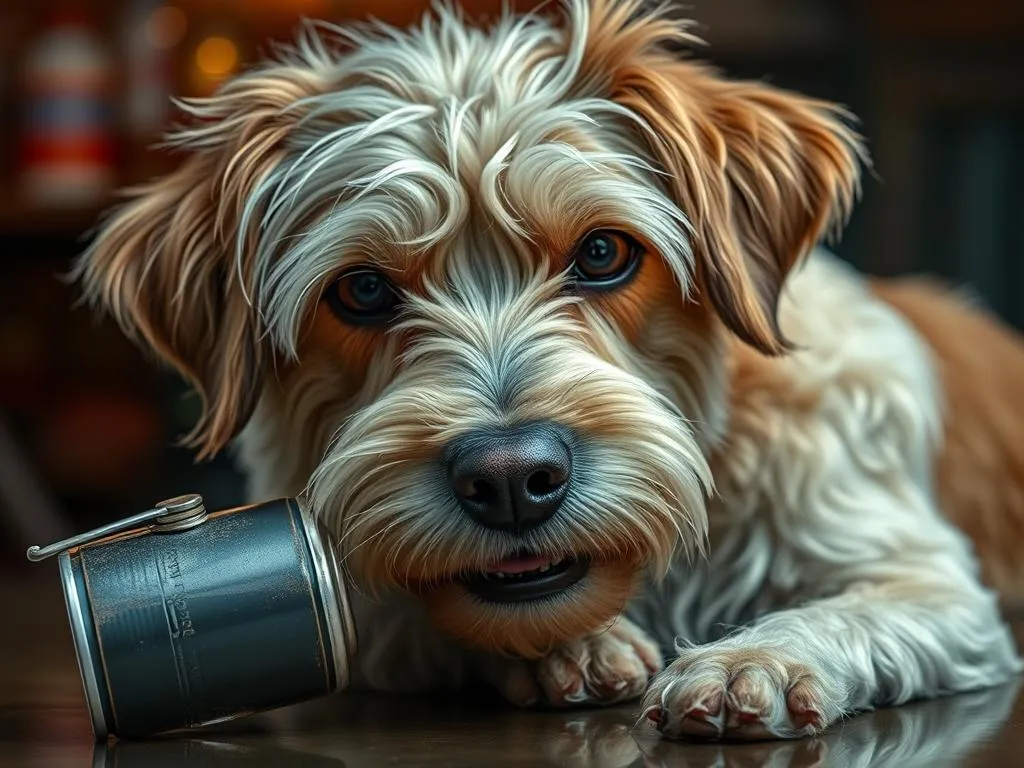
Introduction
Caring for a dog involves understanding their health needs and the potential dangers they may encounter in their environment. One such danger that often goes unnoticed is the consumption of alcohol. As loving pet owners, it is crucial to grasp the effects of alcohol on dogs, including whether dogs can get drunk.
Drunkenness in dogs is defined by the impairment of their normal functions due to alcohol consumption, which can lead to serious health risks. Understanding how alcohol affects our furry companions is vital for their safety and well-being. This article will explore whether dogs can indeed get drunk, the risks associated with alcohol consumption, and what dog owners need to know to keep their pets safe.
Understanding Alcohol and Its Effects on Dogs
What is Alcohol?
Alcohol, scientifically known as ethanol, is a psychoactive substance that is found in many common beverages, including beer, wine, and spirits. Additionally, alcohol can be present in various household items such as mouthwash, certain medications, and even some food products like desserts cooked with alcohol. Understanding where alcohol can be found is the first step in preventing accidental ingestion by your dog.
How Dogs Process Alcohol
Dogs metabolize alcohol differently than humans. The liver processes alcohol, and dogs have a limited ability to break down ethanol. Several factors influence how quickly and effectively a dog can metabolize alcohol:
- Size: Smaller dogs are more susceptible to the effects of alcohol than larger breeds due to their lower body mass.
- Breed: Some breeds, particularly those with pre-existing health issues, may be more vulnerable to alcohol’s effects.
- Age: Puppies and very old dogs may not handle alcohol well due to their immature or declining organ function.
The combination of these factors can lead to varying levels of intoxication in dogs, even from small amounts of alcohol.
Symptoms of Alcohol Intoxication in Dogs
Recognizing the symptoms of alcohol intoxication in dogs is critical for prompt intervention. Signs of alcohol intoxication may include:
- Physical Signs: Stumbling, lethargy, loss of coordination, and vomiting.
- Behavioral Signs: Disorientation, unusual aggression, lethargy, or hyperactivity.
- Severity Levels: Intoxication can range from mild (slight disorientation) to severe (loss of consciousness), and in extreme cases, it can lead to death.
If you suspect your dog has consumed alcohol, monitoring their behavior closely is essential.
The Risks of Dogs Consuming Alcohol
Short-term Risks
The immediate health effects of alcohol consumption in dogs can be severe. Dogs can experience:
- Hypoglycemia: Alcohol can cause low blood sugar, leading to weakness or seizures.
- Respiratory Failure: High levels of alcohol can depress the central nervous system, affecting breathing.
- Alcohol Poisoning: This is a life-threatening condition characterized by severe symptoms such as confusion, vomiting, seizures, and loss of consciousness.
Long-term Risks
In addition to immediate dangers, long-term alcohol consumption can lead to chronic health issues, including:
- Liver and Kidney Damage: Prolonged exposure to alcohol can severely affect these vital organs.
- Neurological Damage: Repeated intoxication can cause lasting behavioral changes or cognitive impairment.
Vulnerable Dog Populations
Certain groups of dogs are particularly at risk from alcohol consumption:
- Puppies: Their developing bodies are less equipped to handle toxins.
- Older Dogs: These dogs may have weakened organs or pre-existing health conditions that make them more susceptible to alcohol’s effects.
- Specific Breeds: Breeds like Greyhounds and those with known sensitivities may react more severely to alcohol.
Common Scenarios Where Dogs Might Encounter Alcohol
Accidental Ingestion
Accidental ingestion of alcohol is a common occurrence in households. Dogs may find and consume spilled drinks or food items that contain alcohol. Signs to watch for include:
- Unusual behavior or disorientation
- Vomiting or loss of coordination
- Excessive drooling or lethargy
Social Gatherings
Parties and gatherings where alcohol is present pose a significant risk for dogs. They may have access to unattended drinks or food laced with alcohol. To prevent access, consider the following tips:
- Keep drinks out of reach.
- Assign a designated dog-watcher during gatherings.
- Educate guests about the dangers of alcohol for dogs.
Misconceptions About Alcohol and Dogs
There are many myths surrounding the consumption of alcohol by dogs, such as the belief that dogs can handle beer or that a small amount won’t harm them. The truth is that even small amounts of alcohol can pose significant health risks to dogs. Always err on the side of caution and keep all forms of alcohol away from your pet.
What to Do If Your Dog Consumes Alcohol
Recognizing Symptoms of Intoxication
If you suspect your dog has consumed alcohol, observe them closely for symptoms, including:
- Stumbling or loss of balance
- Vomiting or excessive drooling
- Changes in behavior, such as aggression or lethargy
Keep a checklist of symptoms to monitor their condition.
Immediate Steps to Take
If your dog shows signs of intoxication, take immediate action:
- Do Not Induce Vomiting: Unless advised by a veterinarian, inducing vomiting can sometimes do more harm than good.
- Contact a Veterinarian: Always consult a veterinarian for guidance. Provide them with details about your dog’s size, the amount of alcohol consumed, and the symptoms observed.
Veterinary Care
During a veterinary visit, the vet will assess your dog’s condition, which may include:
- Blood Tests: To determine the level of alcohol in their system.
- Fluid Therapy: To help flush the alcohol out of their system and prevent dehydration.
- Monitoring: Your dog may need to be monitored for several hours to ensure their condition stabilizes.
Preventative Measures for Dog Owners
Creating a Safe Environment
Prevention is the best strategy for keeping your dog safe from alcohol. Here are some tips for dog-proofing your home:
- Store all alcoholic beverages securely, out of reach of your dog.
- Be mindful of food items that may contain alcohol, particularly during celebrations.
- Use baby gates or closed doors to limit your dog’s access to areas where alcohol might be present.
Educating Others
It’s important to inform friends and family about the risks of alcohol for dogs. Communicate clearly about the dangers, especially during social gatherings. Discussing the potential for accidents can help create a safer environment for your pet.
Responsible Pet Ownership
Responsible dog ownership goes beyond preventing alcohol exposure. Consider these general health care tips to promote your dog’s overall well-being:
- Regular veterinary check-ups to monitor health and prevent issues.
- A well-balanced diet tailored to your dog’s specific needs.
- Regular exercise and mental stimulation to keep your dog healthy and happy.
Conclusion
In conclusion, understanding the question of whether dogs can get drunk is crucial for every dog owner. Alcohol poses a significant health risk to dogs, leading to both short-term and long-term complications. By educating ourselves and taking proactive measures to keep our pets safe, we can ensure a healthier and happier life for our furry companions. Remember, responsible dog ownership includes being aware of potential hazards and acting promptly to protect our dogs from harm.
In the end, keeping our pets safe means being informed and vigilant, especially around potentially dangerous substances like alcohol. Your dog relies on you to provide a safe environment, and understanding the risks associated with alcohol consumption is a vital part of that responsibility.









